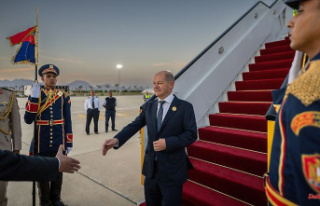The relief packages are not targeted enough for the economists. According to them, households that cannot cope with the energy prices should benefit in a targeted manner. The five professors make suggestions and criticize Finance Minister Lindner's tax plans.
The five economic wise men advise the federal government to temporarily demand a higher top tax rate or an energy bonus for higher earners. The economists want to make the relief packages against inflation more social and affordable. In addition, "partial financing through a strictly limited increase in the top tax rate or an energy solidarity surcharge for higher earners could be considered," says the annual report, which is available to the "Süddeutsche Zeitung".
"The previous measures, such as the tank discount, were often not very targeted and also benefited the higher income groups to a large extent," says the report. If possible, only households that cannot cope with the energy prices should be relieved. So especially citizens with little money who "spend a significantly higher proportion of their income on rent and groceries than households with higher incomes".
The wise men reject the tax plans of Finance Minister Christian Lindner, who want to compensate for the cold progression. In principle, it is necessary to compensate for the cold progression. "In the current situation, in which relief for lower income groups in particular appears necessary and the situation in public finances remains tense, it would be advisable to postpone this compensation to a later date."
According to the Süddeutsche Zeitung, the Wise Men are more aggressive on nuclear power than the Greens might like. With a word of power, Chancellor Olaf Scholz ended the dispute between the FDP and the Greens and stipulated that the nuclear power plants could run until mid-April next year at the latest. The Wise Men now write: "An extension of the term beyond April 15, 2023 would help to relax the electricity market."
According to TÜV Süd, there are no safety concerns about continuing to operate the Isar 2 nuclear power plant: "Against this background, the federal government should carefully examine whether it is possible to extend the service life beyond April 15."
At the same time, the Council makes it clear that it sees the future in renewable energies: In order to "accelerate their expansion and quickly end the temporary use of coal and nuclear power plants, regulatory uncertainties for investors should be avoided". The government should work to ensure that the distance rule 10-H in Bavaria, which hinders the expansion of wind power, is abolished.












